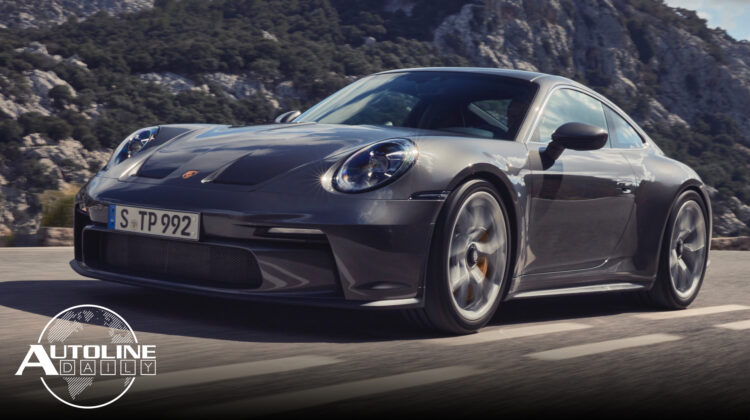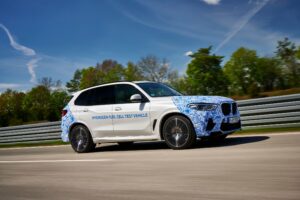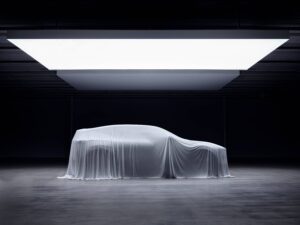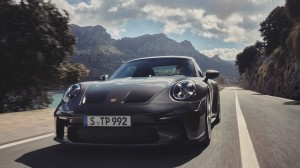
Listen to “AD #3102 – Porsche Launches Less Flashy 911 GT3; GM Boosts EV Investment By 30%; Franchised Dealer Network Advantages” on Spreaker.
Follow us on social media:
Runtime: 8:55
0:08 Most OEMs Can Meet CO2 & ZEV Mandates By 2025
0:56 GM to Help Develop Battery & Hydrogen Powered Trains
1:33 BMW Begins Hydrogen-Powered X5 Tests
2:21 Lincoln Accelerates EV Plans
3:23 Polestar 3 Will Be Manufactured at Volvo’s U.S. Plant
4:01 GM Boosts EV Investment By 30%
4:33 Study Calls Out Most EU Automakers Over EVs
5:33 Porsche Introduces Less Flashy 911 GT3
6:55 Advantages of The Franchised Dealer Network
Visit our sponsors to thank them for their support of Autoline Daily: BorgWarner, Bridgestone, Intrepid Control Systems and Schaeffler.
This is Autoline Daily, the show dedicated to enthusiasts of the global automotive industry.
MOST OEMs CAN MEET CO2 & ZEV MANDATES BY 2025
Alix Partners came out with a comprehensive study of the automotive industry. One of the findings is that by 2025 automakers will be able to meet CO2 and ZEV mandates on their own. Those mandates are in Europe and California. And in Europe, automakers can combine their total emissions with others to try and get below the standard. They call that pooling. Currently, Honda is paying Tesla to pool its credits. Ford is pooling with Volvo. Toyota is pooling with Mazda. VW is pooling with SAIC, Geely, Aiways and Next.e.go. But Stellantis already announced it no longer needs to pool with Tesla. And as traditional OEMs come out with more BEVs, they will be able to meet these standards on their own.
GM TO HELP DEVELOP BATTERY & HYDROGEN POWERED TRAINS
We’ve shown how fuel cells can be used to power everything from cars to boats and now we can add trains to the list. GM and Wabtec signed a memorandum of understanding to develop fuel cell systems for locomotives using GM’s Ultium batteries and its HYDROTEC fuel cell cubes. Wabtec already has a battery-powered train, called the FLXdrive, which it says can reduce carbon emissions by up to 30%. But it hopes the partnership with GM will accelerate the reduction of emissions from the rail industry. No word yet as to when these trains might come out.
BMW BEGINS HYDROGEN-POWERED X5 TESTS
In related news, BMW hopes to build a small series of hydrogen-powered X5s, called the i Hydrogen NEXT, by the end of next year. The vehicle is currently undergoing tests every day to fine-tune its software. It’s powered by cells from Toyota. Toyota provides the individual cells, then BMW forms them into a stack. BMW also developed the rest of the drive system, which combines two hydrogen tanks that can hold up to 6 kilograms, a small battery pack and the same electric motor found in the iX3. Total system output of roughly 370 horsepower is the same amount as its most-powerful in-line 6-cylinder engine. The small batch of vehicles scheduled for next year will be used in broader field tests.
LINCOLN ACCELERATES EV PLANS
Lincoln announced its accelerating its EV plans and is aiming to electrify its entire lineup by 2030. It plans to introduce four new fully electric vehicles in that time, including its first pure BEV next year. By the middle of the decade, Lincoln expects half of its global sales to be zero emission. This is part of parent company Ford’s $30 billion EV investment by 2025.
POLESTAR 3 WILL BE MANUFACTURED AT VOLVO’S U.S. PLANT
Polestar, Volvo’s premium electric brand, announced its upcoming Polestar 3 SUV, will be manufactured in the U.S. at Volvo’s plant in South Carolina, starting in early 2023. And as part of its U.S. expansion, Polestar will open 25 retail “spaces” across the country this year. The Polestar 3 is built on Volvo’s next-gen EV platform and will feature connectivity features based on Google’s Android Automotive OS infotainment system. That’s all we know about the model for now but more details will be revealed at a later date.
GM BOOSTS EV INVESTMENT BY 30%
General Motors is boosting its commitment to electric vehicles. According to Reuters, the automaker will increase its EV investment 30% to $35 billion through 2025. GM will build two more battery plants in the U.S., in addition to the two it’s already announced. And it will speed up other EV investments. GM’s CEO, Mary Barra, will also meet with House Speaker Nancy Pelosi and other Democrat leaders today to discuss electric vehicles and emissions.
STUDY CALLS OUT MOST EU AUTOMAKERS OVER EVs
Meanwhile over in Europe, a study from the environmental group, Transport and Environment, says Volkswagen and Volvo are the only automakers seriously committed to electric vehicles. It called out BMW, Jaguar Land Rover, Daimler and Toyota for not having “ambitious phase-out targets” for ICEs. And while Ford plans to go all-electric in Europe by 2030, it doesn’t have a robust plan to hit that goal. And it says BMW, Daimler and Toyota rely too heavily on hybrids. The study says even if automakers hit their targets, BEV sales in 2030 could be 10% lower than needed to meet the EU’s Green Deal. The EU is currently targeting a 50% reduction in CO2 emissions by 2030 but Transport and Environment says a 70% decrease is needed in order for Europe to hit its targets.
PORSCHE INTRODUCES LESS FLASHY 911 GT3
The Porsche 911 GT3 is a wicked fast machine that looks ready to tackle any race track. But not all customers want the flashy paint colors, huge rear spoiler and blacked-out wheels. So, it’s expanding the new GT3 lineup with the Touring Package, which gives the car a more understated look. Most notably, there’s no big wing off the back, but it also comes in more subdued paint and large aluminum wheels. There’s a few other minor changes and we’ll provide the link if you’d like to learn more. The Touring Package for the 911 GT3 can be ordered right now at no additional charge.
Coming up next John has something to say about the advantages of the franchised dealer network.
ADVANTAGES OF THE FRANCHISED DEALER NETWORK
Some people think franchised dealers are inefficient and outdated. But dealers could turn out to be a key competitive advantage for traditional automakers.
One thing you can say about car dealers, they’re everywhere. They’re in every community from New York to California and Montana to Texas. Every dealership has a line of service bays to service the cars they sell, and dealers compete against each other which keeps prices competitive.
All the EV startups are pulling an end run around dealers and selling direct to consumers. But they don’t have many service centers or repair bays. So how are they going to handle any recalls that cannot be fixed with over the air updates? Believe me, they are going to have recalls.
And that’s why the franchised dealer system could turn out to be a real competitive advantage versus selling direct to consumers.
Alfa Romeo was supposed to make a roaring comeback over the last decade. But it hasn’t happened. Sales of the Giulia and Stelvio came in far below expectations. So what’s next for Alfa Romeo? That’s what we’ll be talking about on Autoline After Hours this Thursday. We’ve got Larry Dominique, the head of Alfa Romeo North America coming on the show. So join Gary and I as we let you listen in to the top executives in the automotive industry.
And that wraps up today’s report, thanks for watching.
Thanks to our partner for embedding Autoline Daily on its website: WardsAuto.com
Seamus and Sean McElroy cover the latest news in the automotive industry for Autoline Daily.









